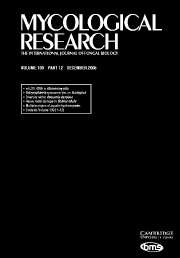Crossref Citations
This article has been cited by the following publications. This list is generated based on data provided by
Crossref.
Jane Barker, Susan
Tagu, Denis
and
Delp, Gabriele
1998.
Regulation of Root and Fungal Morphogenesis in Mycorrhizal Symbioses1.
Plant Physiology,
Vol. 116,
Issue. 4,
p.
1201.
Barker, S. J.
Stummer, B.
Gao, L.
Dispain, I.
O’Connor, P. J.
and
Smith, S. E.
1998.
A mutant inLycopersicon esculentumMill. with highly reduced VA mycorrhizal colonization: isolation and preliminary characterisation.
The Plant Journal,
Vol. 15,
Issue. 6,
p.
791.
Frazer, Lilyann Novak
1998.
One stop mycology.
Mycological Research,
Vol. 102,
Issue. 12,
p.
1571.
Delp, G.
Rosewarne, G. M.
and
Barker, S. J.
1998.
Mycorrhiza Manual.
p.
327.
McGonigle, T P
Hovius, J P
and
Peterson, R L
1999.
Arbuscular mycorrhizae of American ginseng (Panax quinquefolius) in cultivated field plots: plant age affects the development of a colonization lag phase.
Canadian Journal of Botany,
Vol. 77,
Issue. 7,
p.
1028.
Delp, Gabriele
Smith, Sally E.
and
Barker, Susan J.
2000.
Isolation by differential display of three partial cDNAs potentially coding for proteins from the VA mycorrhizal Glomus intraradices.
Mycological Research,
Vol. 104,
Issue. 3,
p.
293.
Dickson, S.
and
Smith, S. E.
2001.
Cross walls in arbuscular trunk hyphae form after loss of metabolic activity.
New Phytologist,
Vol. 151,
Issue. 3,
p.
735.
Timonen, S
Smith, F A
and
Smith, S E
2001.
Microtubules of the mycorrhizal fungus Glomus intraradices in symbiosis with tomato roots.
Canadian Journal of Botany,
Vol. 79,
Issue. 3,
p.
307.
Cavagnaro, T. R.
Gao, L‐L.
Smith, F. A.
and
Smith, S. E.
2001.
Morphology of arbuscular mycorrhizas is influenced by fungal identity.
New Phytologist,
Vol. 151,
Issue. 2,
p.
469.
Cavagnaro, T. R.
Smith, F. A.
Lorimer, M. F.
Haskard, K. A.
Ayling, S. M.
and
Smith, S. E.
2001.
Quantitative development of Paris‐type arbuscular mycorrhizas formed between Asphodelus fistulosus and Glomus coronatum.
New Phytologist,
Vol. 149,
Issue. 1,
p.
105.
Gao, L‐L.
Delp, G.
and
Smith, S. E.
2001.
Colonization patterns in a mycorrhiza‐defective mutant tomato vary with different arbuscular‐mycorrhizal fungi.
New Phytologist,
Vol. 151,
Issue. 2,
p.
477.
Fester, Thomas
Hause, Bettina
Schmidt, Diana
Halfmann, Kristine
Schmidt, Jürgen
Wray, Victor
Hause, Gerd
and
Strack, Dieter
2002.
Occurrence and Localization of Apocarotenoids in Arbuscular Mycorrhizal Plant Roots.
Plant and Cell Physiology,
Vol. 43,
Issue. 3,
p.
256.
Hause, Bettina
Maier, Walter
Miersch, Otto
Kramell, Robert
and
Strack, Dieter
2002.
Induction of Jasmonate Biosynthesis in Arbuscular Mycorrhizal Barley Roots,.
Plant Physiology,
Vol. 130,
Issue. 3,
p.
1213.
Dickson, Sandy
Schweiger, Peter
Smith, F Andrew
Söderström, Bengt
and
Smith, Sally
2003.
Paired arbuscules in the Arum-type arbuscular mycorrhizal symbiosis with Linum usitatissimum.
Canadian Journal of Botany,
Vol. 81,
Issue. 5,
p.
457.
Delp, Gabriele
Timonen, Sari
Rosewarne, Garry M.
Barker, Susan J.
and
Smith, Sally
2003.
Differential expression of Glomus intraradices genes in external mycelium and mycorrhizal roots of tomato and barley.
Mycological Research,
Vol. 107,
Issue. 9,
p.
1083.
Cavagnaro, Timothy R.
Smith, F. Andrew
and
Smith, Sally E.
2004.
Interactions between arbuscular mycorrhizal fungi and a mycorrhiza‐defective mutant tomato: does a noninfective fungus alter the ability of an infective fungus to colonise the roots – and vice versa?.
New Phytologist,
Vol. 164,
Issue. 3,
p.
485.
Cavagnaro, T. R.
Smith, F. A.
Hay, G.
Carne‐Cavagnaro, V. L.
and
Smith, S. E.
2004.
Inoculum type does not affect overall resistance of an arbuscular mycorrhiza‐defective tomato mutant to colonisation but inoculation does change competitive interactions with wild‐type tomato.
New Phytologist,
Vol. 161,
Issue. 2,
p.
485.
Dickson, S.
2004.
The Arum–Paris continuum of mycorrhizal symbioses.
New Phytologist,
Vol. 163,
Issue. 1,
p.
187.
Gao, Ling-Ling
Knogge, Wolfgang
Delp, Gabriele
Smith, F. Andrew
and
Smith, Sally E.
2004.
Expression Patterns of Defense-Related Genes in Different Types of Arbuscular Mycorrhizal Development in Wild-Type and Mycorrhiza-Defective Mutant Tomato.
Molecular Plant-Microbe Interactions®,
Vol. 17,
Issue. 10,
p.
1103.
Vierheilig, Horst
Schweiger, Peter
and
Brundrett, Mark
2005.
An overview of methods for the detection and observation of arbuscular mycorrhizal fungi in roots†.
Physiologia Plantarum,
Vol. 125,
Issue. 4,
p.
393.


